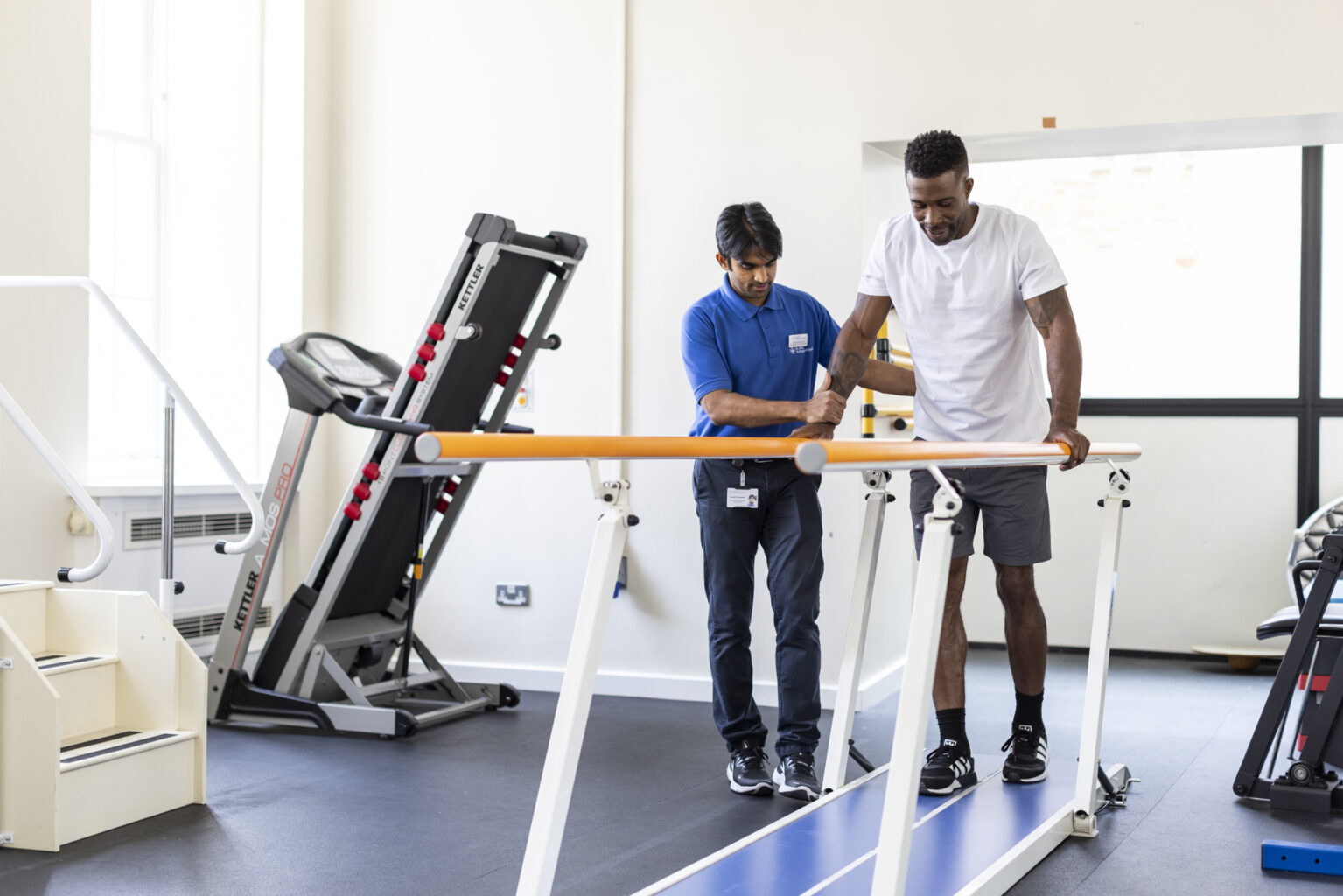Contact number: 020 7806 4060
Neurophysiotherapy as part of Stroke Rehabilitation
Neurophysiotherapy, also known as neurological physiotherapy, is a specialised branch of physical therapy that focuses on the assessment and treatment of individuals with neurological conditions, including stroke. The primary goals of neurophysiotherapy for stroke patients are to help them regain as much function and independence as possible and improve their overall quality of life.
High intensity therapy is key to regaining function after a stroke, which is why we have physiotherapists on-hand seven days a week to help you. Recovering from a stroke takes time, patience and expertise to relearn lost abilities and gain new ones.
As one of UK’s leading stroke rehab centres, our team of specialist neurological physiotherapists offer a comprehensive range of treatments in our state-of-the-art facilities, including:
- Coordination and balance re-training
- Functional activities that promote independence
- Mobility and strength training
- Improving exercise tolerance
- Normalising muscle tone
- Trunk stability & strengthening
- Gait retraining
- Hand therapy
Our physiotherapists can also be seen on an outpatient basis, so treatment doesn’t end at discharge.
A bespoke treatment plan for all patients
The process begins with a thorough initial assessment of the patient’s physical and neurological condition. This assessment includes evaluating muscle strength, joint range of motion, coordination, balance, sensation, and any impairments in movement and mobility. The physiotherapist will also consider the patient’s medical history, specific stroke-related deficits, and personal goals.
Based on the assessment findings, the physiotherapist develops an individualised treatment plan tailored to the patient’s unique individual needs and goals. The plan may be adjusted over time as the patient progresses.
Stroke patients often experience weakness, spasticity, or paralysis in one or more limbs. Neurophysiotherapy aims to improve these issues through exercises and activities that target mobility, coordination, walking ability and motor control. This may involve strength training, stretching, and functional movement training.
Stroke survivors frequently have balance and coordination problems. The physiotherapist will work on exercises and activities to enhance balance and coordination through exercise therapy, which can help reduce the risk of falls.
Many stroke survivors struggle with walking and may require assistance or mobility aids. Neurophysiotherapy includes gait training to help patients regain a functional walking pattern, improve step length and symmetry, and reduce gait abnormalities.
Stroke patients may experience pain or discomfort due to muscle spasticity, contractures, or joint issues. Neuro physiotherapists can employ various techniques, including manual therapy and modalities such as heat or ice, to manage pain and promote comfort.
Although there may be much difficulty to start with, it is only through consistent practice, exercise and effective treatment that you can recover from this experience.
Fast access to personalised care
We offer stroke physiotherapy on an inpatient or outpatient basis, tailoring treatment to your needs. All referrals are triaged to ensure the best approach for achieving your goals.
Our intensive stroke rehab package provides daily therapies designed to maximise recovery. Early intensive therapy is key to reaching your full potential but remains beneficial later when working towards specific goals.
Every stroke affects individuals differently. We provide rapid access to expert assessment and personalised treatment, working closely with you and your family for the best possible recovery.
Continued support when you go home
When you are ready to leave the hospital, we will support you every step of the way. We will help arrange any care, therapy and equipment you might need going forwards, by referring to your local NHS or private services. Our support doesn’t need to finish when you leave us!
All our therapy services are also available in our outpatient therapy department, and this is of great benefit to those who want to continue their rehabilitation journey.
Patient Story
Watch our video to learn about how Dr Sageet Amlani and our Therapies Team helped a patient regain their quality of life.
While on holiday in Switzerland, Kay suffered a stroke, leaving her paralysed on her right side with difficulty swallowing and speaking. Her husband urgently sought the best care and contacted St John & St Elizabeth Hospital.
Through intensive rehabilitation at our Stroke Rehab Centre, including physiotherapy, occupational therapy, speech therapy, and counselling, Kay regained movement within four weeks. Now, 15 months later, she no longer needs medication, can swim, cycle, and continues to improve.
How to pay for your treatment
If you’re… paying for yourself
Did you know you don’t need private medical insurance to come to St John & St Elizabeth Hospital? As a self-pay patient, you can access safe, outstanding quality health care at times to suit you.
For scans and tests, as well as to see most consultants, you’ll still need to be referred by a medical professional like your GP, but as a self-pay patient, the process is more straightforward. You won’t need authorisation from an insurance provider, and you’ll have greater choice of therapist and appointment times.
If you’re… insured
St John & St Elizabeth Hospital is approved by all major medical insurance companies. If you have a personal private health insurance policy, or your company provide it for you, you can use it to pay for your care from your initial consultation through to treatment, surgery and aftercare such as physiotherapy. Not all private health insurance plans cover the same things. It’s very important to check exactly what you are covered for with your insurance provider.

